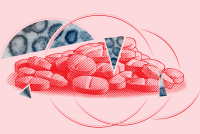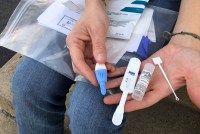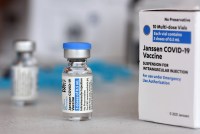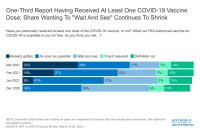Latest KFF Health News Stories
Journalists Track Biden’s First 100 Days
KHN and California Healthline staff made the rounds on national and local media this week to discuss their stories. Here’s a collection of their appearances.
Addiction Treatment Providers in Pa. Face Little State Scrutiny Despite Harm to Clients
Pennsylvania’s Department of Drug and Alcohol Programs has allowed providers to continue operating despite repeated violations and harm to clients.
KHN’s ‘What the Health?’: 100 Days of Health Policy
It’s 100 days into Joe Biden’s presidency and a surprisingly large number of health policies have been announced. But health is notably absent from the administration’s $1.8 trillion spending plan for American families, making it unclear how much more will get done this year. Meanwhile, the Centers for Disease Control and Prevention loosens its mask-wearing recommendations for those who have been vaccinated, but the new rules are confusing. Joanne Kenen of Politico, Mary Ellen McIntire of CQ Roll Call and Sarah Karlin-Smith of the Pink Sheet join KHN’s Julie Rovner to discuss these issues and more. Plus, Rovner interviews KHN’s Julie Appleby, who reported the latest KHN-NPR “Bill of the Month” episode.
Doctors More Likely to Prescribe Opioids to Covid ‘Long Haulers,’ Raising Addiction Fears
Chronic pain from covid can linger for months after patients appear to recover from the disease.
KHN’s ‘What the Health?’: Picking Up the Pace of Undoing Trump Policies
The Biden administration has started to speed efforts to reverse health policies forged under Donald Trump. Most recently, the administration overturned a ban on fetal tissue research and canceled a last-minute extension of a Medicaid waiver for Texas. That latter move may delay the Senate confirmation of President Joe Biden’s nominee to head the Medicare and Medicaid programs, as Sen. John Cornyn (R-Texas) seeks to fight back. Anna Edney of Bloomberg News, Rachel Cohrs of Stat and Alice Miranda Ollstein of Politico join KHN’s Julie Rovner to discuss these issues and more. Plus, for extra credit, the panelists recommend their favorite health policy stories of the week they think you should read, too.
Peligran avances contra el VIH por la lucha contra covid, en especial en el sur del país
El impacto exacto de una pandemia sobre la otra todavía está por evaluarse, pero los datos preliminares inquietan a expertos que hasta hace poco celebraban los enormes avances en el tratamiento del VIH.
Strides Against HIV/AIDS Falter, Especially in the South, as Nation Battles Covid
Public health resources have shifted from one pandemic to the other, and experts fear steep declines in testing and diagnoses mean more people will contract HIV and die of AIDS.
The Shock and Reality of Catching Covid After Being Vaccinated
At least 5,800 people have fallen ill or tested positive for covid two weeks or more after being fully vaccinated, according to the CDC. “I now tell everyone, including my colleagues, not to let their guard down.”
KHN’s ‘What the Health?’: Pause and Effect on Covid Vaccines
Podcast panelists discuss a range of health policy developments, from the latest in the covid vaccination effort to the HHS budget, among other things.
FDA Seeks a New Way to Review Old Drugs Without Causing Prices to Soar
A misguided federal program called the Unapproved Drugs Initiative, which put the FDA’s stamp of approval on old drugs, led to higher prices. It’s scrapped. So now what?
Cuatro respuestas sobre el freno a la vacuna contra covid de Johnson & Johnson
Expertos en salud se preguntan si el freno a la vacuna de J&J a causa de seis casos de mujeres que desarrollaron coágulos luego de recibirla puede impactar negativamente en los esfuerzos de inmunización.
4 Things to Know About the J&J Covid Vaccine Pause
The messaging surrounding vaccine safety and efficacy may mean as much as the science.
Backed by Millions in Public and Private Cash, Rapid Covid Tests Are Coming to Stores Near You
Over-the-counter covid tests could help speed the economy’s recovery, allowing students and workers to test themselves at home and get quick results. Could they become as ubiquitous as toothpaste and cold remedies on store shelves, or will demand dry up as the nation gets vaccinated?
KHN’s ‘What the Health?’: Planning for Round Two
The ink is barely dry on the recent covid relief bill, but Democrats in Congress and President Joe Biden are wasting no time gearing up for their next big legislative package. Meanwhile, predictions of more states expanding Medicaid have proved premature. Alice Miranda Ollstein of Politico, Rachel Cohrs of Stat and Kimberly Leonard of Business Insider join KHN’s Julie Rovner to discuss these issues and more. Plus, Rovner interviews KHN’s Lauren Weber, who reported the latest KHN-NPR “Bill of the Month” episode.
Ask KHN-PolitiFact: How Can Covid Vaccines Be Safe When They Were Developed So Fast?
Experts say there’s nothing new about the research underpinning the covid vaccines and that they were tested in more participants than many other approved vaccines.
Covid Vaccine Hesitancy Drops Among All Americans, New Survey Shows
A nationwide poll released by KFF also revealed which arguments are most compelling to persuade people to get a shot — and which ones are unlikely to work.
Medicamentos ya conocidos, y baratos, podrían ser clave para tratar covid
Hay medicamentos aprobados hace años que podrían investigarse en profundidad para tratar covid. Pero no hay interés porque no generarían grandes ganancias.
Scientists Seek Covid Treatment Answers in Cheap, Older Drugs
Philanthropies are funding studies of cheap, existing medications like the antidepressant fluvoxamine as covid treatments. But early hype about hydroxychloroquine and other repurposed drugs leaves researchers leery of hasty conclusions.
How Much of Trump’s Health Agenda Has Biden Undone?
In his campaign, President Joe Biden promised to undo policies, particularly health policies, implemented by former President Donald Trump. Yet, despite immense executive power, reversing four years of action takes time and resources.
KHN’s ‘What the Health?’: Getting Down to Work at HHS
After a bruising confirmation process, Xavier Becerra was sworn in as secretary of Health and Human Services this week. The Senate also confirmed the nominations of former U.S. Surgeon General Vivek Murthy to return to the post he held in the Obama administration, and former Pennsylvania health secretary Rachel Levine as assistant secretary for health. Levine is the first openly transgender person to receive Senate confirmation. Meanwhile, questions continue to swirl around the AstraZeneca covid vaccine, which some public health experts worry will create more hesitancy toward other vaccines.



















